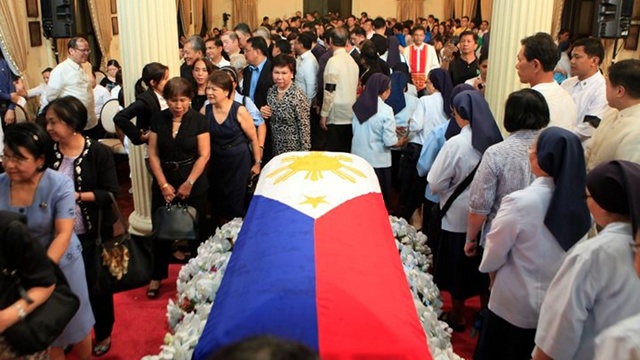SUMMARY
This is AI generated summarization, which may have errors. For context, always refer to the full article.

MANILA, Philippines – The late Interior Secretary Jesse Robredo was a tough act to follow, Cabinet members said in a tribute they organized in Malacanang, Saturday night, August 25.
“Yesterday, Sec Cesar Purisima and I were discussing what Jesse’s passing means for all of us here, and in a moment of levity, Cesar remarked, ‘Mahirap itong nangyari kay Jesse. Pag tayo ang namatay at hindi ganito ang reaksyon ng mga tao sa atin, baka sabihing hindi tayo nagtrabaho!” Budget Secretary Florencio Abad joked in his eulogy for Robredo.
(What happened to Jesse is a tough one. If we die and the people don’t react in the same manner, we might be perceived as having not done our work.)
Abad, Robredo’s colleague in the Cabinet’s cluster on Good Governance and Anti-Corruption, arrived at a realization beyond how the nation reacted to Roberdo’s demise.
“Jesse is a tough act to follow. He also set an extraordinary standard in the manner he lived his life—as a public official, as a family man, and as a servant of God,” Abad remarked, breaking the laughter that reverberated in Kalayaan Hall where Robredo’s remains will lie in state until Sunday, August 26.
The face of a new era in PH politics
Proceeding with his eulogy, Abad reflected on the character of the man he worked with for nearly two years, explaining why his death was an enormous loss to the country and a big blow to the Cabinet.
“First and foremost, by Jesse’s uncanny—almost unmatched—ability to navigate the delicate complexities of public service: the day-to-day demands that come with making our agencies simply work; and while struggling with that, the much more demanding goal of reforming how our departments function so that we can achieve results efficiently and with greater transparency and accountability; and on top of all these, the even more wrenching demands of the politics of our work,” Abad said.
Abad stressed that the resistance of forces which seek to undermine reforms magnified the challenges Robredo had to face as he discharged the political aspect of his duties as Interior Secretary.
Abad believed that it was when he immersed himself in the competing confluences of governance, politics, and development that Robredo’s leadership stood out.
“Even more remarkably, he would emerge from these turbulent currents with his integrity intact, his optimism as boundless as when he began, and his actions a source of inspiration for everyone to follow in his footsteps,” Abad said.
Abad cited the culture of transparency now injected in the procurement activities of the Philippine National Police (PNP) and the seal of good housekeeping that set higher standards of performance among LGUs, as sterling examples of Robredo’s efforts to introduce reforms in the bureaucracy.
A good man
While many of their peers in politics and development were consumed by the “corrosive culture of patronage” or became “embittered cynics,” Abad said that Robredo remained “largely unscathed in a bureaucracy notorious for its moral casualties.”
“He did all this without engendering acrimonious relationships with colleagues and stakeholders. In fact, he regularly dealt with people often deemed too dangerous: drug lords, crime syndicates, war lords, rogue policemen, among others,” Abad revealed.
According to Abad, Robredo also acted as mediator in disputes between the government and urban informal settlers facing eviction, in conflict-ridden communities in the ARMM.
“He could talk to just about anybody with absolute sincerity. The doors to his heart were swung wide open to practically anyone: from state leaders to government staff, all the way to the lowliest of people in Naga, whom he dutifully served,” Abad said.
“In the end, however, the sum of his achievements is founded on a basic truth: mabuting tao si Jesse. Jesse was a good man. This may seem an oversimplification, but oftentimes, we fail to recognize how hard it is to be good, to remain honorable in the face of unrelenting challenges,” Abad said. – Rappler.com
Related Stories:
- Leni Robredo to Jesse: Rest well, we love you forever
- Aquino to Robredo: Mission accomplished
- #SalamatJesse: tributes to the late Jesse Robredo
- Homily at the requiem mass for Sec Jesse Robredo
- [VLOG] Carmela Fonbuena: Robredo’s last day in Naga
- Nation bids final farewell to Robredo
- Aika Robredo: Family ‘at peace’
- The day Naga found out Robredo died
- National Days of Mourning for Robredo
- Jesse Robredo’s journey back home
- PNoy’s promises to Robredo’s wife
Add a comment
How does this make you feel?
There are no comments yet. Add your comment to start the conversation.